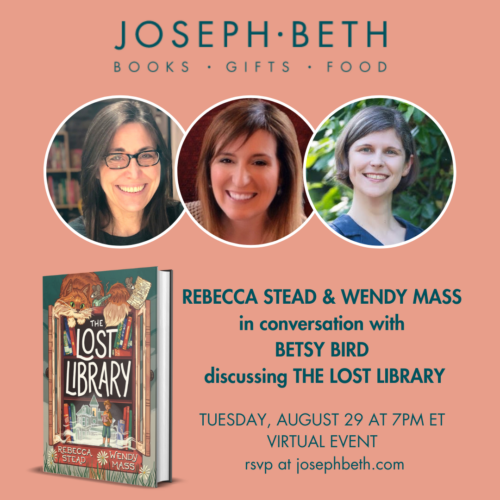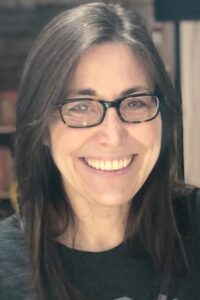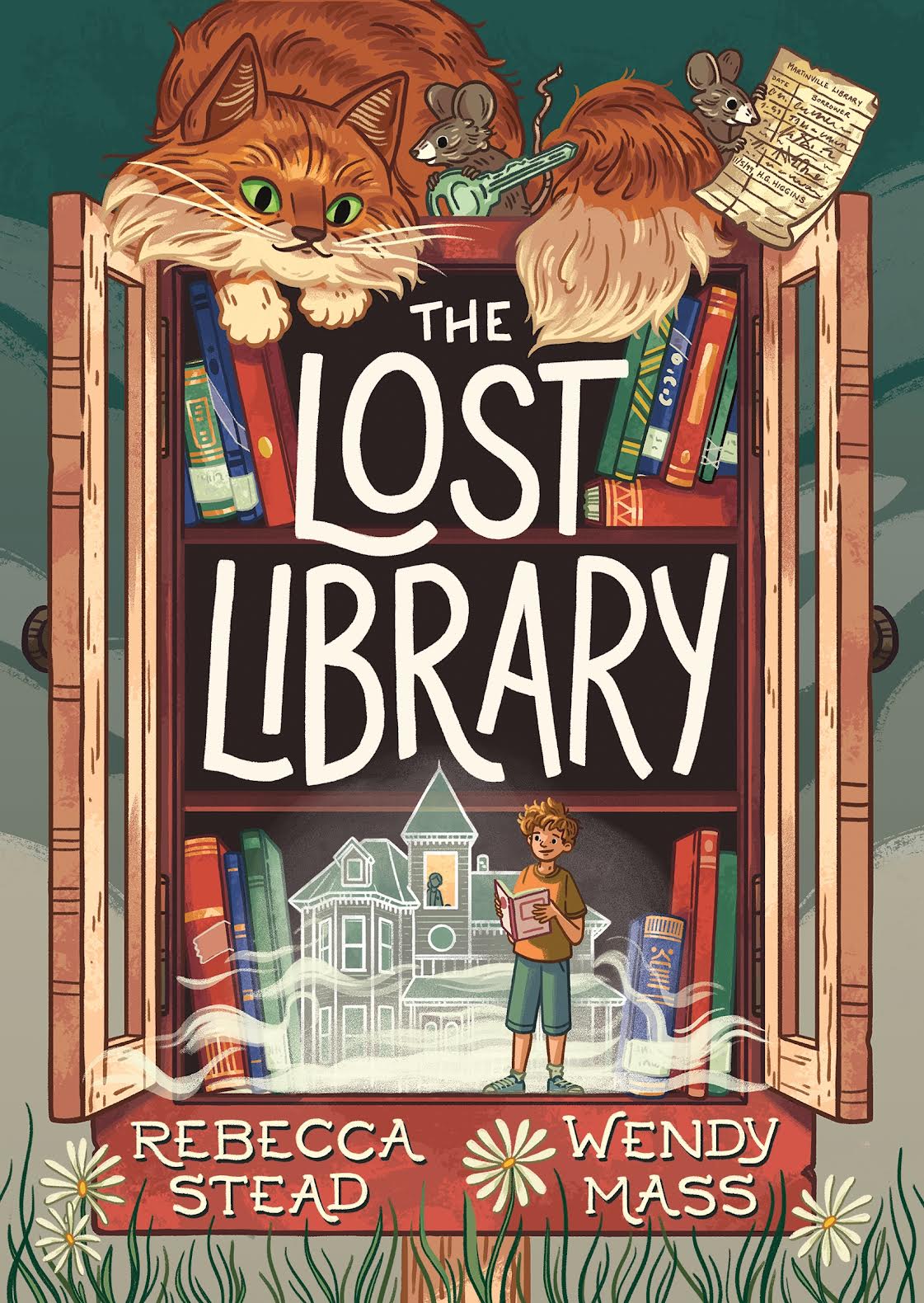Interviews and Excerpts: Wendy Mass & Rebecca Stead Discuss ... - afuse8production.slj.com
So this is a bit of a trip. Today, at 7 p.m. ET, I will actually be virtually interviewing the authors Wendy Mass and Rebecca Stead for the Cincinnati bookstore Joseph-Beth. Why not join us? The info is here:

Now if you can't make the talk, have no fears. I'm actually ALSO asking Rebecca and Wendy some interview questions here on the blog today. This is all in celebration of their newest collaboration, the book The Lost Library (out in bookstores and libraries, yep, TODAY!). They've collaborated in writing before, so I had a couple questions for them.
SCROLL TO KEEP READING THIS POST
ADVERTISEMENT
ADVERTISEMENT
But wait! There's more! On top of ALL that, we're also premiering a bit of text from the book itself. Just consider it a small preview to whet your whistle.
First, though . . .
Betsy Bird: Rebecca and Wendy it is such a pleasure to get to talk to you today! Now I know that this isn't your first collaboration (I believe the novel BOB holds that particular honor). But still, I don't think enough people know how you two started working together. Why don't you each give me your own version of this turn of events?

Rebecca Stead: We met at a writers' conference in Vermont (Kindling Words, for anyone interested) in 2008 or 2009, having already read each other's work. I was a fan of Wendy's A MANGO-SHAPED SPACE. I think we felt an immediate connection.
Wendy Mass: I'd just finished reading Rebecca's first book, FIRST LIGHT, and couldn't wait to meet her to tell her how much I loved it. We fell into an easy friendship and even back then had talked about one day writing something together.
BB: Twas meant to me. Now because you're both authors, it seems the only logical way to ask you questions is to just throw them out there and whoever answers first wins. When you're writing together how does an idea come into being? Does one person say "Eureka!" and then call the other, or do you work on them from the idea's inception onward?
RS: As usual with writing, the answer is "it depends." With BOB, there was almost no planning. I wrote the first chapter in one sitting on a plane from Melbourne to Los Angeles. It ended (still does) with Livy opening a closet door in her grandmother's house and finding a creature she takes for a zombie in a chicken suit. I sent it to Wendy, and she said, more or less, "let's go!" and wrote chapter two from Bob's point of view.
THE LOST LIBRARY took a completely different path. We talked about it ahead of time, and had fun thinking about writing something twisty and playful that embraces different genres – mystery, ghost story, cat and mouse story. We sent a proposal to Feiwel & Friends at the end of 2020. It's the only book I've ever sold on proposal.
BB: And as a follow-up question, where did THE LOST LIBRARY come from?

WM: We snuck a little free library into the end of BOB and knew that so many stories can stem from a place where people can take (and leave) free books. So the arrival of a mysterious little free library in the center of a small town became the foundation for the story, and we basically constructed the novel around it.
BB: I believe BOB took the both of you around seven years to write. How long did THE LOST LIBRARY take in comparison?
RS: Two years. Improvement!
BB: Vastly! I have to ask but do either of you own a Little Free Library yourself?
WM: My daughter built one, and got permission to place it in a shopping center a few blocks away. As the steward, she makes sure there's a selection of books and checks to make sure it's still in good shape (cleans the glass, tightens the latch, makes sure the space around it is clean and no random things have been placed inside!). It was really exciting the first time we stopped by and realized that none of the books inside had come from us!
BB: Finally, do you have plans for any future writing endeavors together?
RS: We don't have anything in the works, but writing is mysterious.
WM: What she said. ;o)
Ah, writers. So mysterious.
So now, enjoy this selection from THE LOST LIBRARY. I thought we'd just give you a taste of some of what the book is all about:

Chapter Three
Evan
On the absolute last Monday morning of fifth grade, Evan climbed the dirt road that led from his house to the Martinville town green, where his school was.
"Climbed," because it was mostly one long hill.
———————————————
Chapter Four
Al
Hold on, now. (I would say "take my hand," but we both know that this is impossible.)
The eye of the story has moved—the eye has left Mortimer the six-toed cat, and now it's looking at Evan the fifth grader.
Some people really hate that.
But Evan and Mortimer live in the same town. In fact, they are about to cross paths. Briefly.
I live in Martinville, too. That's where all of this is happening.
It will make sense. Soon.
———————————————
Chapter Five
Evan Again
Just ahead, Evan saw the magnolia tree that meant he was three quarters of the way to school. He checked his watch. By running a little bit, he had earned himself five free minutes. Evan loved making free time and then spending it however he wanted.
His back against the tree trunk, he looked down the hill he had just climbed. It was the "less fancy" part of Martinville: dirt road, no sidewalks or streetlights. To Evan, it was the most beautiful part of town: lots of trees and sky, and now that it was almost summer, everything was covered in a bright new green. (In the spring, Evan's road was usually muddy, and he loved it slightly less.)
He took two apples and his journal out of his backpack.
The apples were not "store apples." They didn't really get shiny, no matter how much he rubbed them. They were from the apple trees planted behind their house by his father's great-grandmother, or someone like that. The un-shiny apples were lumpy shaped and kind of small, which was why Evan had two of them.
Sometimes in the cafeteria kids said "ew" to Evan's apples, which was why he liked to eat them before school. They tasted perfectly great.
Evan found his pen, opened to a new journal page, and waited for an idea to bubble up. Mr. O'Neal said they could write about anything at all. But they were supposed to write something every day.
He waited. But no ideas bubbled up.
Instead, he thought about how, early that same morning, Mr. Vanderbilt, who was some kind of businessman, had shown up on Evan's front porch before breakfast, demanding a refund from his dad.
"What did you do, send them away for a long weekend?" he'd called through the screen door between the porch and the kitchen. "You were supposed to kill them!"
The mice in his house had come back just three days after Evan's dad had supposedly "exterminated" them, and now, Mr. Vanderbilt said, he was going to have to hire a "real exterminator" to do the job.
"Refund!" he shouted through the screen door.
Evan's father had sat down at the table and written Mr. Vanderbilt a check.
In fact, Evan knew that his dad did not kill any mice. He trapped them instead, in small cages, and then he drove them over the mountain, where he released them into some woods.
"I don't know why they can't stay put—it's a perfectly nice little forest," Evan's dad muttered after Mr. Vanderbilt left with his refund. "Plenty of berries and things."
"Too many owls?" Evan's mother guessed.
"Hmm," said his father. And he stomped down the cellar steps to his office.
His parents had had this conversation many times before.
A lot of people came for refunds.
Evan pressed his back against the tree trunk, swallowed the last of his apple, and watched the clouds traveling across the soft blue sky. They were the feathery kind. Evan's dad had taught him some things about clouds on their campouts.
He braced the journal on his bent knees and started writing: Cirrus clouds are always high up, never low down. To me, they look like feathers, taste like hot chocolate, and smell like bug spray. Cirrus clouds can move really fast.
He knew he couldn't smell the clouds. But they reminded him of camping out with his dad, sitting cross-legged on their sleeping bags and drinking hot chocolate for breakfast. There were always little bubbles of dry hot-chocolate powder floating on top, which Evan loved. When they finished their hot chocolate, they would make instant oatmeal in the same cups. And then his dad would say, "Let's go find a trail."
He didn't write all of that. Instead, he tossed both apple cores down the hill (not littering, his dad always said, because they would be eaten by grateful animals), stuffed his journal into his backpack, stood up, and put on his imaginary cape.
No one knew about the cape. His dad had "given" it to Evan way back in kindergarten, when Evan was having trouble saying goodbye at the classroom door in the mornings the way everyone was supposed to.
Evan had kept the imaginary cape all these years. In his mind, he knew exactly what it would look like, if it were real: a red felt triangle, with two strings to tie it on. Too small now, for sure. Evan was actually the tallest kid in his grade. And he really liked school. But he also liked his cape.
He checked his watch again, turned himself around, and marched toward school.
He was very close to town when he saw the little free library for the first time. It rose up ahead of him, little by little, as he climbed the last bit of hill. Evan didn't know right away that it was a library. All he saw was the back of it: a wooden rectangle, sitting on a pole. A new sign? Or maybe someone's art project?
SCROLL TO KEEP READING THIS POST
ADVERTISEMENT
ADVERTISEMENT
As he got closer, he understood that he was looking at a box. He crossed the street, stepped onto the grassy town green, and walked all the way around it.
Aha.
It was not just a box on a pole. It was a box on a pole with a set of small glass doors on one side.
And behind the doors were books.
He was still early for school. No one else was near the strange book box, other than a large and beautiful orange cat, lying in the shade beneath it.
"I know you," Evan said. He did know this cat—Evan's mother called it Goldie. In the morning, Goldie was usually sitting in an upstairs window of Martinville's History House, about fifty steps away. Before this, Evan had never once seen the cat outside. But he was pretty sure it was the same cat.
"What are you doing out here?" Evan asked. The cat tipped his face up to the sun and blinked sleepily.
Evan turned his attention to the funny box of books.
When he pulled, the glass doors swung open easily. A smell floated out.
A smell like . . . applesauce? And . . . cheese? But mostly applesauce.
Strange. But it was a good smell.
A little handwritten sign was attached to the single shelf inside:
Take a book, leave a book. Or both.
Evan breathed in applesauce (cheese?) until there was no more room inside him for the air to go.
Take a book, leave a book. Or both.
Evan decided to take two books. The smallest two, which he figured was the same as taking one. He shoved them into his bag without looking at them, and then he carefully closed the glass doors. But that smell seemed to follow him all the way to school.
The cat stayed put.
And that's that!

Thanks so much to Samantha Sacks and the folks at the Macmillan Children's Publishing Group for going above and beyond the call of duty to set me up with these two creators. And like I say, you can find The Lost Library on school, bookstore, and library shelves everywhere starting today!
Filed under: Excerpts, Interviews
Comments
Post a Comment